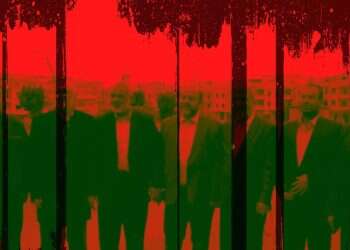International Atomic Energy Agency Director Yukiya Amano confirmed on Monday that Iran has again started to enrich uranium beyond previous levels. At the same time, as American sanctions continue to squeeze the Iranian economy, Tehran's rhetoric toward the West is only intensifying. Meanwhile, Germany's foreign minister flew to Iran and other diplomats have tried mediating between Washington and the Islamic republic.
Against this backdrop, we must ask, which path does Iran wish to take? Do its aggressive actions and words portend a military clash, or is this simply a state of static tension before the launch of new negotiations?
Meir Javedanfar from the Lauder School of Government, Diplomacy and Strategy at the Interdisciplinary Center Herzliya, says the Iranians are pushing the envelope as a signal to US President Donald Trump that his conduct could lead him to an unwanted destination.
"The Iranian government, which is a horrible dictatorship, essentially fulfilled every aspect of the nuclear deal signed with the West. They didn't violate the deal and still are not violating it, and in principle are meeting their obligations despite starting to enrich uranium again. Thus, there's a great deal of frustration in Tehran. In their view they met all of the deal's conditions, while Trump came along and is simply attacking them economically in an extremely harmful manner," Javedanfar says.
"Therefore, they are cautiously showing the American president that they also have their limits, which are finite and could lead to a situation of open conflict with the United States. The government in Iran knows Trump himself doesn't want war, and thus is maneuvering and pushing back gently, to show Trump that the rope can snap. This is also important for them for the purpose of domestic optics; because Trump is badly humiliating the regime and it has to project strength.
"In actuality, all of its muscle-flexing aside, Iran is anxiously awaiting the 2020 election in the United States. They very much want to see a new American administration replacing Trump. If Donald Trump wins again the regime will be faced with an intolerable situation because US sanctions are very painful for the Iranians and suffering them for another four years will be impossible for them. Therefore it's possible they will decide to turn the situation on its head. At the moment they aren't doing so, rather they are playing within their range of maneuverability, to let Trump know he's not the only one with the ability to threaten."
Searching for a path to a new deal
IDF Lt. Col. (ret.) Mickey Segall, formerly head of the Military Intelligence Directorate Research Division's Iran desk and a senior analyst at the Jerusalem Center for Public Affairs, believes that although Iran and the US are threatening one another publicly, in actuality they are implementing quiet understandings behind the scenes.
"On one hand the Iranians are accelerating their uranium enrichment, adding new centrifuges, and pro-Iranian elements are active in the region, for instance, the attack by Houthi rebels in Saudi Arabia over the weekend (and again on Wednesday morning); all indicate that the Iranians are signaling they have room to maneuver. As a reminder, a month ago the Iranians declared they were giving Europe 60 days to arrange a new deal. On the other hand, the Iranian intelligence minister said in May that 'Iran needs to show courage and flexibility," Segall noted.
"The Iranian foreign minister visited Oman, which helped mediate the previous nuclear deal. The German foreign minister is currently in Iran, while the US and its allies in the region are presently gritting their teeth in the face of Iranian provocations. This tells us there is a comprehensive initiative in the works by both sides to reach understandings or to reinstitute calm. This isn't assured to work and it's quite possible there will ultimately be a giant conflagration because some pro-Iranian actor has carried out too successful an operation or another form of miscommunication.
"It appears, however, that at least for now the sides don't want conflict, rather quiet understandings," Segall concludes. "At least that's the impression from the way things currently stand."




